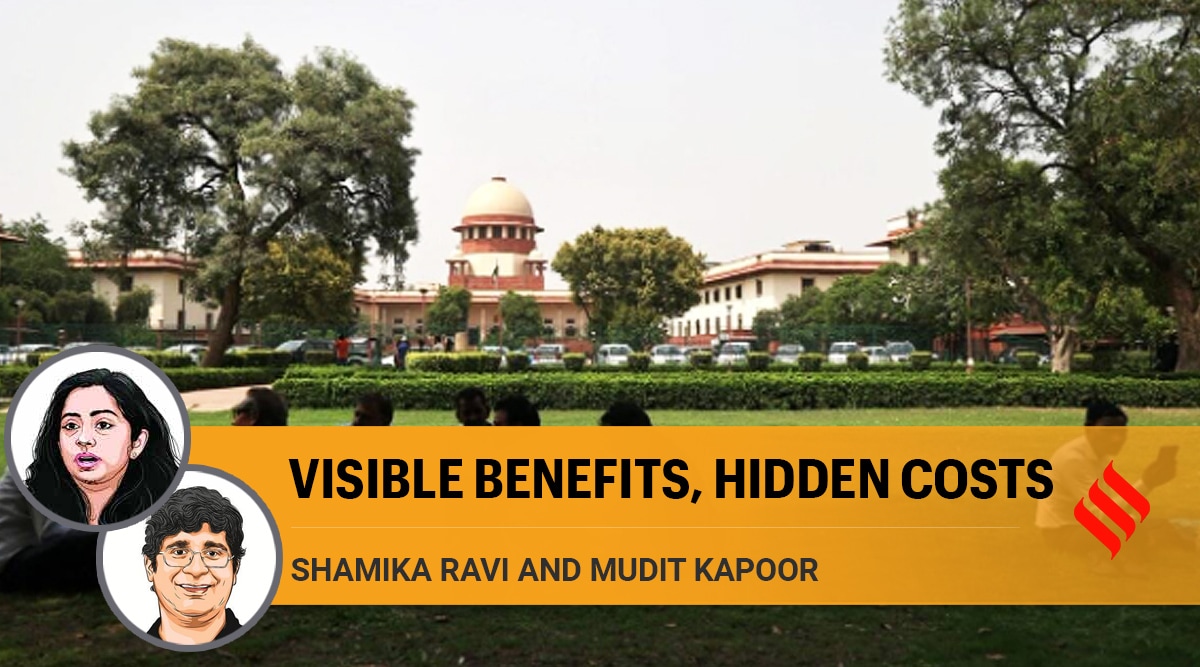 Shamika Ravi and Mudit Kapoor write: The SC is now considering setting up an expert panel to examine the issue of freebies announced by the political parties during elections. (File)
Shamika Ravi and Mudit Kapoor write: The SC is now considering setting up an expert panel to examine the issue of freebies announced by the political parties during elections. (File)A recent PIL against “irrational freebies” in the Supreme Court of India (SC) has reignited a national debate on political posturing to win elections by offering freebies and a responsible government. In light of this, the SC is considering setting up an expert panel to examine the issue of freebies announced by the political parties during elections. The debate has several layers that merit attention:
First, what constitutes freebies: Are free electricity, free water, free transport, free education, etc. freebies? Fredrich Hayek, a conservative thinker who, while being deeply suspicious of the power of the state, argued in The Road to Serfdom that the state must guarantee a basic social minimum “of food, shelter, and clothing, sufficient to preserve health and the capacity to work” to everyone. This argument has two critical aspects: One, it is an individual rights-based approach to welfare and development. Two, equally important from the perspective of debate on freebies, it limits the state’s power to provide only a bare minimum to the individual needed to preserve their health and work capacity. The only technical issue (admittedly a challenging one) that needs to be determined is the minimum quantity of food, clothing, and shelter to be guaranteed to everyone, and perhaps to expand this list to include education, water, sanitation, and clean air, since Hayek made this argument in the 1940s.
In India, we have made significant strides in this direction through the right to food, education, and work. Perhaps one could argue that during the Covid-19 lockdown, the government’s ability, capacity, commitment, and constitutional responsibility to deliver minimum food rations to the lowest strata of society prevented a mass-scale catastrophe. Similarly, the government’s commitment and resolve to freely vaccinate more than a billion people with at least one dose in a short period averted a major health disaster. In both cases, the state had to step up because the survival of the individual was at stake.
The second layer of the argument concerns state’s responsibility to finance freebies. After all, there is no free lunch. The PIL petitioners on “irrational freebies” have argued that during the elections, when politicians woo voters by offering freebies, they must also provide a comprehensive financing plan for the freebies to the voters and taxpayers. This line of argument is an important and responsible one but remains myopic as it misses a crucial point regarding the true costs of freebies. We have to make a distinction between accounting and economic costs. For example, consider the case of free electricity to a particular sector of the economy where the political party presents a credible and feasible financial plan from an accounting perspective. However, from an economic perspective, a subsidy to one sector of the economy creates distortions and an implicit tax on the other sectors. As a result, resources move from the non-subsidised sector to subsidised sectors. Individuals in the subsidised sectors benefit at the expense of individuals in the non-subsidised sector. The overall economic loss due to distortions could be higher than the benefits to the subsidised sector. Therefore, the real cost over and above freebies’ accounting costs are economic distortions, leading to reduced growth and lower productivity.
Subscriber Only Stories
Unfortunately, the distortionary costs of freebies, in terms of forgone opportunities, are challenging to quantify upfront but their effects are significant and will definitely be felt over time.
Take the case of Punjab. Till the early 2000s, Punjab’s per capita GDP was one of the highest among the large states in India; it exceeded that of Himachal Pradesh, Haryana, Gujarat, Maharashtra, Karnataka, Tamil Nadu, and Kerala. Punjab heavily subsidised the agricultural sector — besides severe ecological implications, the subsidy left little fiscal room to provide incentives to other sectors like industries and services. In contrast, neighbouring and other states mentioned above were not burdened so extensively by the agricultural subsidies and hence could incentivise high-growth and job-creating sectors like manufacturing and services. This triggered a major relocation of firms (and jobs) from Punjab to other states that offered a more conducive growth environment. Punjab saw rapid deindustrialisation as a consequence of its myopic and distortionary policies. Manufacturing clusters of Gurdaspur, Mandi, Jalandhar, Gobindgarh and Ludhiana struggled for years with a lack of growth and eventually reported rampant closures.
As a result, post-2001, Punjab’s per capita GDP began to lag behind that of Himachal Pradesh, Haryana, Gujarat, Maharashtra, Karnataka, Tamil Nadu, and Kerala and the gap has widened over time. As a result of the distortions, the unemployment rate in Punjab was also higher than the national average. Punjab illustrates that while examining the issue of freebies, one has to look not only at the fiscal feasibility in the short run but also at the distortions created by these freebies, which will make them unsustainable over time.
In summary, one could argue that there are universal freebies that the state must guarantee, which include security, justice, and bare minimum amenities (for example, food, shelter, education, water, sanitation, and clean air) that preserve individuals’ health and capacity to work. For every other freebie, whether in the form of subsidies or exemptions, in addition to the immediate financial burden, the state must consider the hidden distortionary effects of these freebies on the overall economy that would lower growth and productivity and jobs — and hence reduce individual capacity.
(Ravi is Vice President, Observer Research Foundation, and Kapoor is Associate Professor, Indian Statistical Institute)
This article first appeared in the print edition on August 30, 2022, under the title, ‘Freebies’ distortionary effects on economy must also be accounted for’